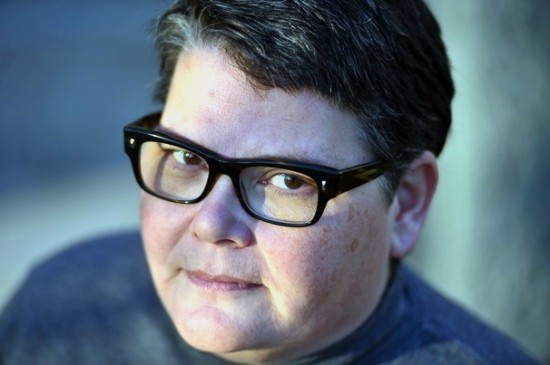And the Washington Post looks at her “blending of faiths”:
Barbara describes a deep if sometimes conflicted relationship with Catholicism, which she calls a basic, unchangeable part of her identity.
In her 20s, Johnson remembers her growing doubt about Catholic institutions as she wrestled with accepting her sexuality, and later as she watched the clergy sex abuse crisis unfold. She went to services in other Christian churches: Unitarian, Baptist, Episcopalian.
“During that time I found a lot of answers in Buddhist teachings and texts,” she said.
In the last decade Johnson returned to her alma mater, Elizabeth Seton High School, to teach art, a move she said was part of a process of coming back to Catholicism on her own terms. She describes long talks with colleagues about Buddhism and the Gospels. And of watching both her parents get sick and the power of their faith, of rituals like reciting the traditional prayer the Memorare with her dying father, of holding her mother and chanting “Hail Mary” as the elder woman passed away.
“This is so surreal because I was getting closer and closer to my faith,” she said of those who assail her for seeking Communion with her blended faith identities. “I had really integrated my Catholic identity into my larger identity as someone who is very influenced by Buddhist teachings.”
Johnson says she never stopped seeing herself as a Catholic, and never stopped attended Mass or taking Communion – albeit not very regularly.
But no doubt orthodox Catholics would see this approach as a violation of their faith and challenge the idea that she could she seek Communion if she also sees herself as a Buddhist.
“The words in the Mass have been my guidepoint. It says, ‘Lord I am not worthy to receive you,’ and these words, before Communion every Mass I’ve said those words with as much conviction in my body and soul as possible, and been guided by the feeling of what was in my body and my conscience. If I felt I wasn’t worthy, I wouldn’t go.”
Today she says that Buddhism and Catholicism are both part of her identity. The two traditions “inform one another in this constant internal conversation,” she told the Post.
Johnson is aware of the criticism she is getting, and wonders: Does it disqualify her from her faith to challenge it?
“Wasn’t the doubting Thomas good because he was in dialogue with his faith? It’s not between me and other Catholics, it’s between me and God.”
Meantime, Ed Peters looks at some questions that have arisen:
So, are priests supposed to help lesbian Buddhists commit sacrilege against Our Lord by giving them holy Communion?
Deep breath, Ed….Okay. Let’s break this down.
Lesbian. First, the Church regards the homosexual/lesbian condition as “disordered” in somewhat the same way that one may regard alcoholism as a “disorder”. According to our tradition, one may not deny holy Communion to an individual suffering from a “disorder”, so, those Catholics calling for the banning of “a lesbian” from Communion are violating our tradition (not to mention our canon law). That said, however, it is possible to deprive one of holy Communion who engages in conduct that amounts to canonically verified “obstinate perseverance in manifest grave sin” (c. 915), as canon law uses each of those terms. I have said from the beginning of this mess, verifiable conduct, not asserted status, is the only question relevant here. Now, if someone wants to make the case that all five (per c. 18) of those banning conditions were canonically satisfied a few minutes before Mass one day, they are free to try. I think they would fail in the attempt, but that’s just my opinion. In any case, at least such persons would be talking about what is relevant here, the law on holy Communion, and not just using rhetorical questions as cudgels.
Buddhists. Buddhists have no right to holy Communion; baptized persons, in accord with law, have the right to holy Communion (c. 912, etc.). This woman was baptized Catholic. The presumption is, therefore, that she had a right to Communion, and the burden is on those who would deny her same to prove that she is no longer permitted by law to receive holy Communion, here, on the grounds that she is a Buddhist. That is a heavy burden of proof, of course, and one not likely sustainable in a short conversation before Mass one day, and one made even more difficult in the wake of a Notification handed down in April 2006 regarding the “formal act of defection” and its relation to, among other things, the canonical crime of apostasy (cc. 751, 1364), and in turn its impact on the application of wider canon law to such individuals. In short, canonists know that a Catholic’sclaim to be a Buddhist, and a Catholic’s being canonically recognized as being a Buddhist, are very distinct things. Those who are not canonists may be excused not being aware of the difference, but not for ignoring it once it is pointed out to them.
Comments are now closed.












